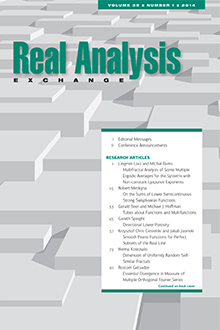Abstract
We consider local dimensions of probability measure on a complete separable metric space \(X\): \(\overline{\alpha}_\mu(x) =\underset{r\to 0}{\varlimsup} \frac{\log_\mu(B_r(x))}{\log r}, \underline{\alpha}_\mu(x)=\underset{r\to 0}{\varliminf} \frac{\log_\mu(B_r(x))}{\log r}\). We show (Theorem 2.1) that for a typical probability measure \(\underline{\alpha}_\mu(x)=0\) and \(\overline{\alpha}_\mu(x)=\infty\) for all \(x\) except a set of first category. Also \(\underline{\alpha}_\mu(x)=0\) almost everywhere and with some additional conditions on \(X\) there is a corresponding result for upper local dimension: in particular, we show that a typical measure on \([0,1]^d\) has \(\overline{\alpha}_\mu(x)=d\) almost everywhere (Theorem 2.4). There are similar results concerning ``global'' dimensions of probability measures. Theorems 2.2 and 2.3 show in particular that the Hausdorff dimension of a typical measure on any compact separable space equals 0 and the packing dimension of a typical measure on \([0,1]^d\) equals \(d\).
Citation
Julia Genyuk. "A Typical Measure Typically Has No Local Dimension." Real Anal. Exchange 23 (2) 525 - 538, 1997/1998.
Information





